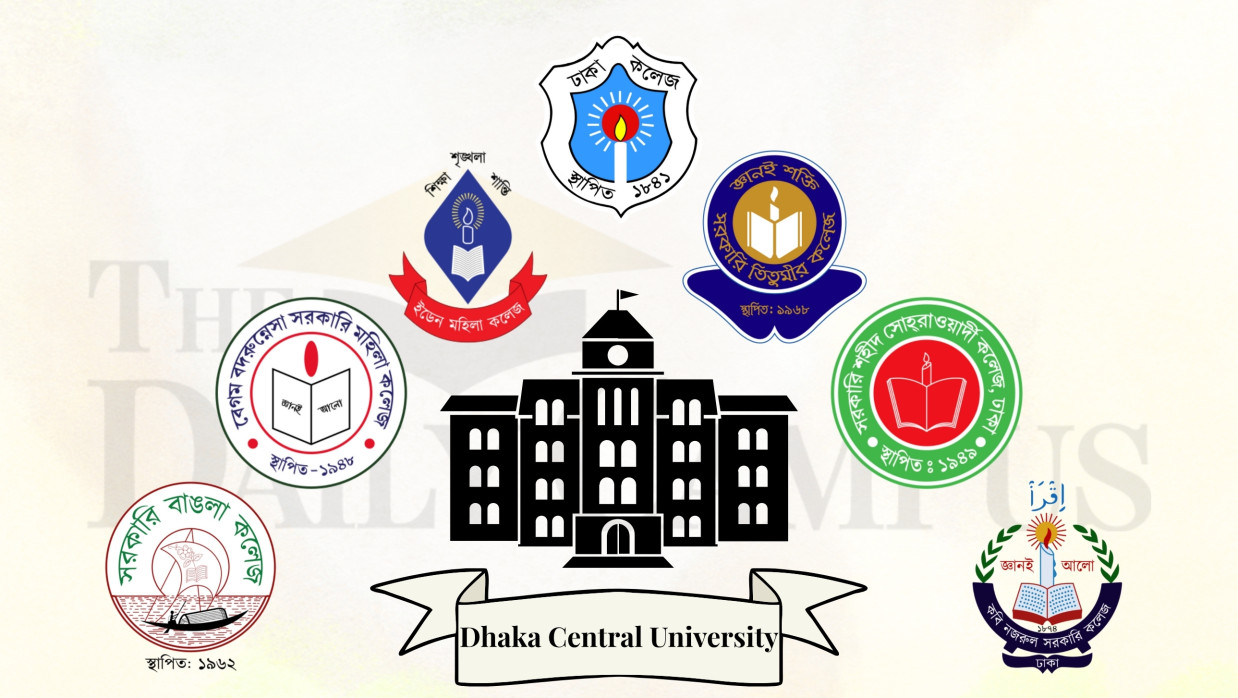
Dhaka Central University to Be Established in Four Phases
- ০৪ আগস্ট ২০২৫, ১৩:৫৭

The establishment of Dhaka Central University, encompassing seven government colleges in the capital, will be implemented in four phases, as detailed in a press conference held at the Secretariat on Monday, August 4, by the Education Ministry and related authorities. Five of these colleges will continue offering Higher Secondary Certificate (HSC) programs alongside undergraduate studies. The university will adopt a hybrid teaching model, with provisions for laptops and low-cost internet. Current students will complete their studies under the existing academic framework.
The press conference outlined that the university will operate an interdisciplinary and hybrid education system, with 40% online and 60% in-person classes, while all examinations will be conducted physically. Students will study non-major courses for the first four semesters, followed by major courses in their chosen discipline for the next four semesters. Starting in the fifth semester (third year), students can switch disciplines based on meeting specific conditions, though changing campuses will not be allowed. The university’s operations will be governed by an Academic Council, Senate, and Syndicate, with one proctor and 14 deputy proctors (one male and one female per college) across the seven colleges.
Responding to questions about how Dhaka Central University differs from Dhaka University or others, UGC member Professor Mohammad Tanjimuddin Khan said, “Students will study non-major courses until the second year, after which their disciplines will be determined.” For example, achieving specific marks in non-major courses could qualify students for disciplines like accounting or management. When asked if such a model exists globally, he noted, “It may not be available elsewhere, but we’ve studied global models to shape this institution uniquely.”
UGC Chairman Professor Dr. S M A Faiz emphasized, “We’ve accepted students’ demands and will do what’s best for them. We aim for a fair solution and need everyone’s cooperation.” He stressed equal importance for all colleges, stating, “Not just Dhaka College, every college is equally valued. We expect the best outcomes with everyone’s involvement.”
The university’s establishment will proceed in phases: first, approving a draft law and issuing an ordinance; second, signing a tripartite agreement between the Education Ministry, Bangladesh University Grants Commission (UGC), and the university; third, appointing a vice-chancellor and initiating administrative and academic activities; and fourth, determining a central campus location convenient for all. The seven colleges—Dhaka College, Eden Mohila College, Begum Badrunnesa Government Girls’ College, Government Titumir College, Government Shaheed Suhrawardy College, Kabi Nazrul Government College, and Government Bangla College—will be organized into four schools: School of Sciences, School of Arts and Humanities, School of Business Studies, and School of Law and Justice.
.jpg)
Five colleges will maintain HSC programs, with undergraduate and HSC students sharing campus resources through time, space, and resource-sharing methods. Current students will complete their studies under the existing framework, with measures to ensure timely exams, prompt result publication, and reduced session backlogs. Faculty, officers, and staff will be centrally recruited and distributed based on college needs, with centralized budgeting managed by the university. Each college will have modern libraries, cafeterias, medical centers, and transport facilities.
Admissions will be centrally managed, with student numbers per discipline determined rationally. First-year students will receive laptops and accessories, along with affordable internet access. Administrative tasks like admissions, registration, and applications will be handled through an IT-based digital system, with an IT platform for student inquiries.
Professor Mohammad Tanzimuddin Khan clarified that the affiliation of the seven colleges with Dhaka University in 2017, and its subsequent cancellation, lacked legal basis. “The affiliation process and its cancellation had no legal foundation. We’ve taken this special measure to avoid a city-wide crisis,” he said. Regarding current students’ status, he noted, “They remain under the existing framework. Legal aspects will be reviewed, and decisions will follow discussions. The two frameworks are separate.” On whether certificates will reflect college or university names, he said, “Work is ongoing; nothing is finalized.” Addressing social media rumors about administrative roles favoring Bangla College over Dhaka College, he clarified, “No decision has been made; it will be finalized through discussions.”
The admission process has begun, covering 23 disciplines, with plans to expand gradually. Initially affiliated with the National University in 1992, these colleges faced academic and administrative challenges, leading to their 2017 affiliation with Dhaka University. Persistent issues prompted students to demand a separate university, culminating in this initiative.